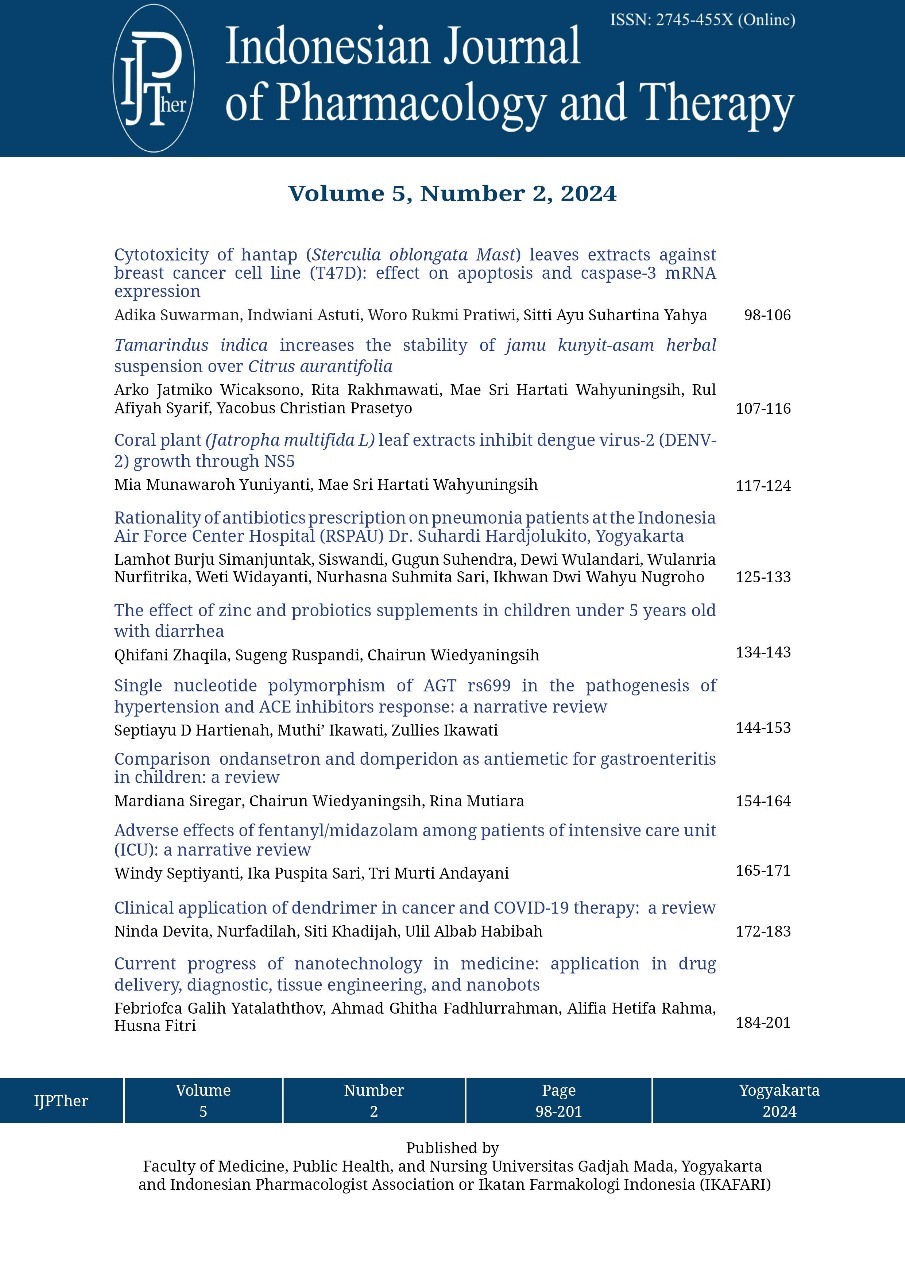Cytotoxicity of hantap (Sterculia oblongata Mast) leaves extracts against breast cancer cell line (T47D): effect on apoptosis and caspase-3 mRNA expression
Abstract
Hantap (Sterculia oblongata Mast) leaves has been traditionally used in Palu, Central Sulawesi to treat breast cancer. However, its scientific evidence is limited. This study aimed to investigate the cytotoxicity of hantap leaf extracts against T47D breast cancer cells. The apoptotic activity of the extracts and its effect on caspase expression were also evaluated. The extracts were prepared by multilevel maceration using n-hexane, methanol, and water. Cytotoxic activity was evaluated by MTT assay. The apoptotic activity was observed by using a fluorescence microscope after acridine orange-propidium iodide (AO/PI) staining, whereas the caspase-3 mRNA expression was examined by using RT-PCR. Among the 3 tested extracts, the methanol extract exhibited the highest cytotoxicity with an IC50 value of 85 μg/mL. The methanol extract at concentrations of 42.5 μg/mL (½IC50), 85 μg/mL (IC50), and 170 μg/mL (2IC50) induced 127.25, 85.50, 479.5% of cell apoptosis, respectively. Furthermore, the methanol extract at concentrations of ½IC50, IC50, and 2IC50 increased 1.04, 1.43 and 1.69 time higher of caspase-3 mRNA expression. In conclusion, the methanolic extract of hantap leaf exhibits cytotoxicity against T47D breast cancer cells, by inducing apoptosis and increasing caspase-3 mRNA expression.
References
merican Cancer Society. Cancer facts and figures. American cancer society, Atlanta; 2017. Available from: https://www.cancer.org/cancer
World Health Organization. Breast cancer, 2024. Available from: https://www.who.int/news-room/fact-sheets/detail/breast-cancer
WHO. Indonesia GLOBOCAN 2020 [Internet]. 2021 [cited 2022 Feb 20]. Available from: https://gco. iarc.fr/today/data/factsheets/populations/360- indonesia-fact-sheets.pdf
Murningsih T, Praptiwi, Liana, Fathoni A. TLC profiling and antioxidant activity of phenolic compound from Sterculia oblongata bark extract. Nusantara Biosci 2019; 11(1):44-8.
https://doi.org/10.13057/nusbiosci/n110108
Ezeonu CS, Ejikeme CM. Qualitative and quantitative determination of phytochemical contents of indigenous nigerian softwoods. New J Sci 2016; 2016(1):9.
https://doi.org/10.1155/2016/5601327
Yahya SAS, Mustofa, Astuti I, Pratiwi WR, Suwarman A. Cytotoxic activity of hantap (Sterculia oblongata Mast) leaves extract against breast cancer cells line (MCF7/HER2): the effect on the expression of HER2 mRNA and the apoptosis. IJPTher 2022; 3(1):1-9.
https://doi.org/10.22146/ijpther.3204
Pu X, Storr SJ, Zhang Y, Rakha EA, Green AR, Ellis IO, Martin SG. Caspase-3 and caspase-8 expression in breast cancer: caspase-3 is associated with survival. Apoptosis 2017; 22(3):357-68.
https://doi.org/10.1007/s10495-016-1323-5
Hengartner MO. The biochemistry of apoptosis. Nature 2000; 407(6805):770-6.
https://doi.org/10.1038/35037710
Dou H, Yu PY, Liu YQ, Zhu Y, Li FC, Wang YY, et al. Recent advances in caspase-3, breast cancer, and traditional Chinese medicine: a review. J Chemother 2023; 36(5):370-88.
https://doi.org/10.1080/1120009X.2023.2278014
Sajjadi SE, Ghanadian M, Haghighi M, Mouhebat L. Cytotoxic effect of Cousiniaver bascifolia Bunge against OVCAR-3 and HT-29 cancer cells. J Her Med Pharmacol 2015; 4(1):15-9.
Cahyani R, Susanto Y, Khumaidi A. Aktivitas antioksidan dan sitotoksik ekstrak etanol daun hantap (Sterculia coccinea Jack.). Nat Sci J Sci Technol 2017; 6(1):11-21.
https://doi.org/10.22487/25411969.2017.v6.i1.8075
El Sherei MM, Ragheb AY, Kassem M, Marzouk M, Mosarrafa S, Saleh N, Phytochemistry, biological activities and economical uses of the genus Sterculia and the related genera: a review. Asian Pacific J Trop Dis 2016; 6(6):492-501.
https://doi.org/10.1016/S2222-1808(16)61075-7
Ezeonu CS, Ejikeme CM. Qualitative and quantitative determination of phytochemical contents of indigenous nigerian softwoods. New J Sci 2016; Article ID: 5601327.
https://doi.org/10.1155/2016/5601327
Abotaleb M, Samuel SM, Varghese E, Varghese S, Kubatka P, Liskova A, et al. Flavonoids in cancer and apoptosis. Cancers (Basel), 2018;11(1):28.
https://doi.org/10.3390/cancers11010028
Galati G, Teng S, Moridani MY, Chan TS, O’Brien PJ. Cancer chemoprevention and apoptosis mechanisms induced by dietary polyphenolics. Drug Metabol Drug Interact 2000; 17(1-4):311-49.
https://doi.org/10.1515/dmdi.2000.17.1-4.311
Elmore S. Apoptosis: a review of programmed cell death. Toxicol Pathol 2007; 35(4):495-516.
http://doi.org/10.1080/01926230701320337
Paus R, Rosenbach T, Haas N, Czarnetski BM. Patterns of cell death: the significance of apoptosis in dermatology. Exp Dermatol 1993; 2(1):3-11.
https://doi.org/10.1111/j.1600-0625.1993. tb00192.x
Martin SJ, Green DR. Apoptosis and cancer: the failure of controls on cell death and cell survival. Crit Rev Oncol Hematol 1995; 18(2):137-53.
https://doi.org/10.1016/1040-8428(94)0012-c
Luiz-Ferreira A, Pacifico T, Cruz ÁC, Laudisi F, Monteleone G, Stolfi C. TRAIL-Sensitizing effects of flavonoids in cancer. Int J Mol Sci 2023; 24(23):16596. https://doi.org/10.3390/ijms242316596
Luiz-Ferreira A, Pacifico T, Cruz ÁC, Laudisi F, Monteleone G, Stolfi C. TRAIL-Sensitizing effects of flavonoids in Cancer. Int J Mol Sci 2023; 24(23):16596.
http://doi.org/10.3390/ijms242316596
Bhosale PB, Hai SE, Vetrivel P, Kim HH, Kim J-A, Park K-II, et al. Flavonoid-induced apoptotic cell death in human cancer cells and its mechanisms. J Biomed Transl Res 2020; 21(2):050-8.
https://doi.org/10.12729/jbtr.2020.21.2.050
Abotaleb M, Samuel SM, Varghese E, Varghese S, Kubatka P, Liskova A, et al. Flavonoids in cancer and apoptosis. Cancers (Basel) 2018; 11(1):28.



